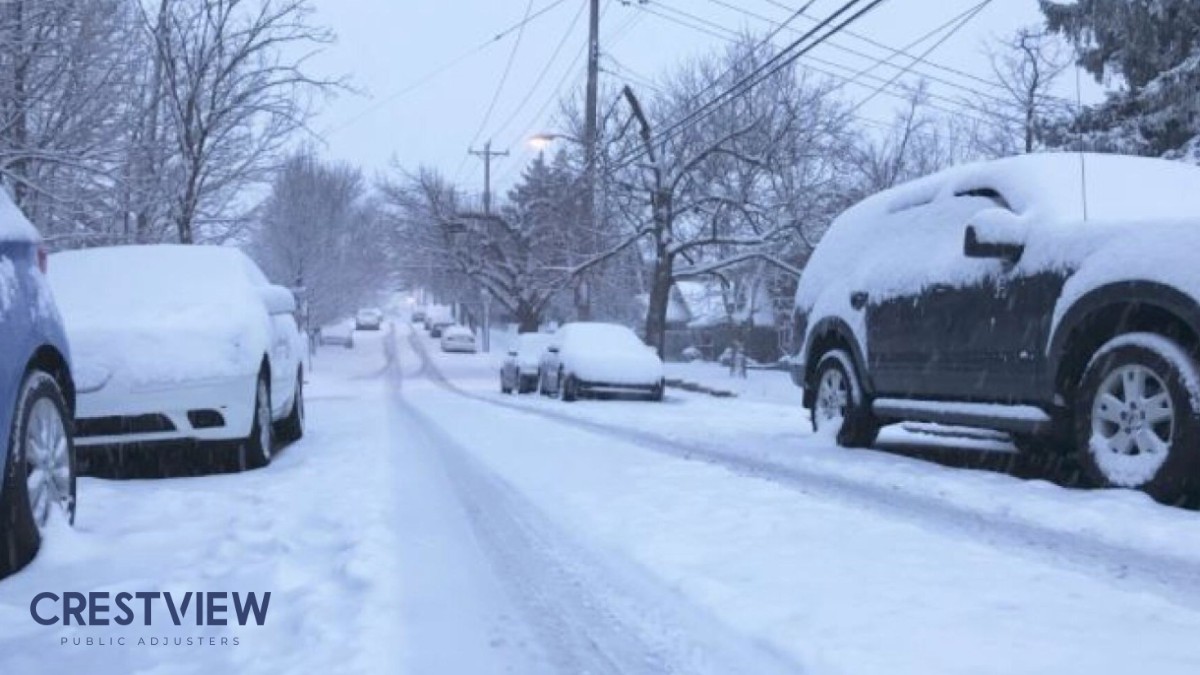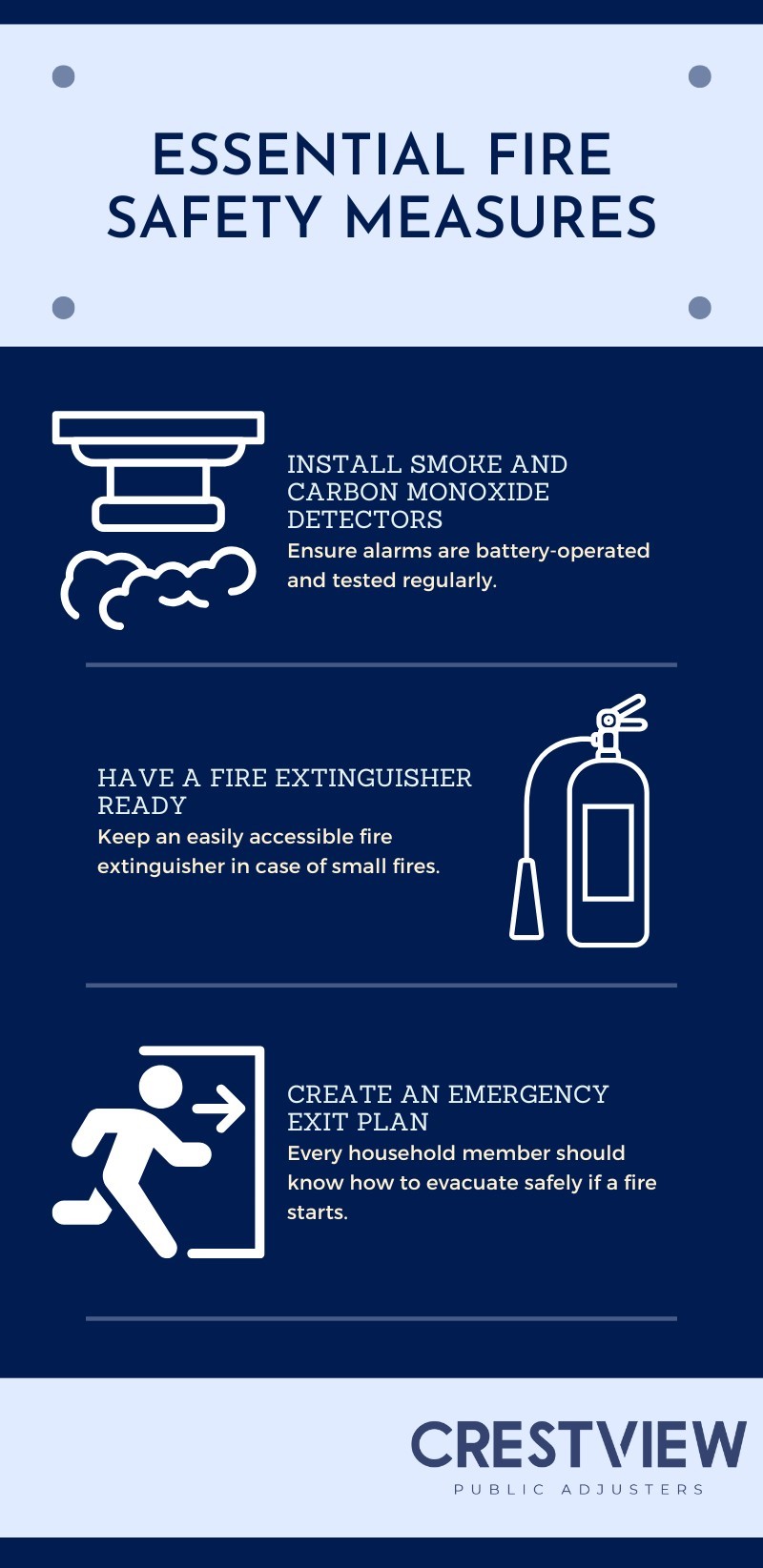Key Points:
- Power outages during winter storms significantly increase fire hazards due to unsafe heating methods, overloaded circuits, and improper generator use.
- Safe heating alternatives and electrical precautions can help prevent fires, including using battery-powered heaters and avoiding candles.
- Policyholders facing fire damage from winter storms should consider working with public adjusters to maximize their insurance claims.
Power outages caused by winter storms pose a major fire hazard, with heating equipment accounting for nearly half of all U.S. home heating fires. When temperatures drop and electricity is unavailable, many homeowners turn to risky heat sources like open flames, portable generators, and space heaters. These emergency solutions, while necessary, often lead to electrical fires, carbon monoxide poisoning, and structural damage.
Preventing fire risk from power failures in winter requires a proactive approach. This includes safe heating methods, generator safety, and proper electrical precautions. Below, we’ll explore the best ways to protect your home and family from fire hazards during a winter power outage.
Why Do Power Outages During Winter Storms Increase Fire Risk?
If a winter storm knocks out power, people often resort to alternative heat and light sources that are not designed for extended or indoor use. These emergency measures, while effective for warmth, significantly increase the chances of house fires.
Primary Causes of Fire During Winter Power Outages:
- Improper Heating Equipment – Space heaters, kerosene heaters, and fireplaces can ignite flammable materials.
- Overloaded Circuits and Power Surges – Once power is restored, electrical surges can spark fires if wiring is outdated.
- Unsafe Generator Use – Running a generator too close to the home or using an improperly rated extension cord can cause fires.
- Candle and Open Flame Hazards – Many homeowners rely on candles for light, increasing the risk of accidental ignition.
Each of these risks can be mitigated through proper preparation, safe heating methods, and adherence to fire safety guidelines.
How to Safely Heat Your Home Without Electricity
If the power is out, keeping warm without increasing fire risk requires strategic and safe heating solutions. While many heating alternatives exist, some are significantly safer than others.
Safe Heating Methods During Power Outages:
- Battery-Powered Heaters – These offer a safe, flameless alternative to traditional space heaters.
- Insulated Indoor Tents and Layering – Trapping body heat by wearing multiple layers and using insulated blankets can maintain warmth.
- Fireplace Safety – If using a fireplace, ensure proper ventilation, use a protective screen, and never leave it unattended.
Heating Methods to Avoid:
- Gas Ovens or Stovetops – Using a gas oven for heat can lead to carbon monoxide poisoning.
- Charcoal Grills Indoors – These produce deadly carbon monoxide and should never be used inside.
- Kerosene Heaters Without Ventilation – While effective, they must be used in a well-ventilated area to prevent toxic fume buildup.
Planning ahead and using safe heating alternatives, homeowners can prevent tragic fire incidents while staying warm.

Are Generators a Fire Hazard During Power Outages?
Yes, generators can be a fire hazard if not used correctly. Portable generators cause thousands of home fires every year, often due to improper fueling, poor ventilation, or overloaded circuits.
Generator Safety Tips:
- Keep Generators Outdoors – Always run generators at least 20 feet away from the home to prevent carbon monoxide poisoning.
- Use the Right Extension Cords – Only use heavy-duty, outdoor-rated extension cords with a sufficient wattage rating.
- Let It Cool Before Refueling – Never refuel a generator while it’s still running, as hot engine parts can ignite spilled fuel.
A properly maintained and correctly used generator provides a safe backup power source without unnecessary fire risks.
How to Prevent Electrical Fires When Power is Restored
If electricity returns after an outage, the sudden surge of power can overload circuits and cause fires. This is especially dangerous in older homes with outdated wiring.
Steps to Prevent Electrical Fires After a Power Outage:
- Unplug Major Appliances – Prevent power surges by unplugging space heaters, TVs, and large electronics.
- Inspect Outlets and Cords – Check for frayed or damaged wires before restoring power to appliances.
- Use Surge Protectors – Plug sensitive electronics into surge protectors to minimize damage from voltage spikes.
Taking these precautions, homeowners can avoid post-outage electrical hazards.
Fire Safety Essentials for Winter Power Outages
Being prepared before a winter storm hits can significantly reduce the risk of fire during a power outage. Homeowners should have a well-stocked emergency kit and follow key fire safety guidelines.

Taking these precautions can mean the difference between safety and disaster when the power goes out.
Get Expert Help for Fire Damage Claims
If your home suffers fire damage from a winter storm-related power outage, navigating an insurance claim can be overwhelming. That’s where public adjusters can help.
Crestview specializes in Winter Damage Claims in Florida, New York, and New Jersey, helping homeowners secure the compensation they deserve for fire-related losses. Our experts handle the complexities of insurance claims, ensuring you receive a fair settlement.
Don’t settle for less—contact Crestview today for expert claim assistance.

